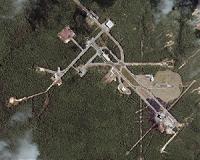 |
Moscow (AFP) Dec 17, 2010 The costly launch failure that caused Russia to delay the deployment of its own satellite system was the result of a fuel miscalculation, a commission charged with probing the accident said Friday. A Proton-M rocket failed to reach its initial orbit during the December 5 launch, causing it to dump the three high-tech Glonass-M satellites near the Hawaii Islands. It marked an embarrassing setback to Russia's much-publicised attempts to introduce a global rival to the US Global Positioning System (GPS), a programme that was first begun by the Soviet Union in 1976. The last three satellites would have enabled Russia to fully deploy the system next year, meeting Prime Minister Vladimir Putin's commitment to equip all new cars sold in Russia with Glonass readers in 2012. Space officials said the calculation mistake was easy to correct, and that they were relieved that there was nothing wrong with the actual rocket itself. "We have no questions regarding the Proton," investigating commission chief Gennady Raikunov told the Interfax news agency. "Its launches could be resumed." Raikunov said the fault lay with the Energia Rocket And Space Corporation, which designed the carrier. He said that the company failed to account for the fact that the updated version of the rocket had bigger fuel tanks, which weighed more when filled to the top. "This increased the payload weight and the rocket did not have the energy to deliver the satellites to orbit," the space official said. Energia officials could not be reached for comment Friday.
Share This Article With Planet Earth
Related Links Rocket Science News at Space-Travel.Com
 Brazil launches rocket into suborbit
Brazil launches rocket into suborbitBrasilia (AFP) Dec 12, 2010 Brazil on Sunday successfully launched a midsized unmanned rocket into space, with hundreds of kilograms (pounds) in cargo and experiments in tow, space officials here said. Scientists from the Agencia Espacial Brasilena (AEB) said the VSB-3 rocket took off from the Alcantara Launch Center in northeast Brazil, reaching an altitude of some 242 kilometers (389 miles). Officials said the ro ... read more |
|
| The content herein, unless otherwise known to be public domain, are Copyright 1995-2010 - SpaceDaily. AFP and UPI Wire Stories are copyright Agence France-Presse and United Press International. ESA Portal Reports are copyright European Space Agency. All NASA sourced material is public domain. Additional copyrights may apply in whole or part to other bona fide parties. Advertising does not imply endorsement,agreement or approval of any opinions, statements or information provided by SpaceDaily on any Web page published or hosted by SpaceDaily. Privacy Statement |